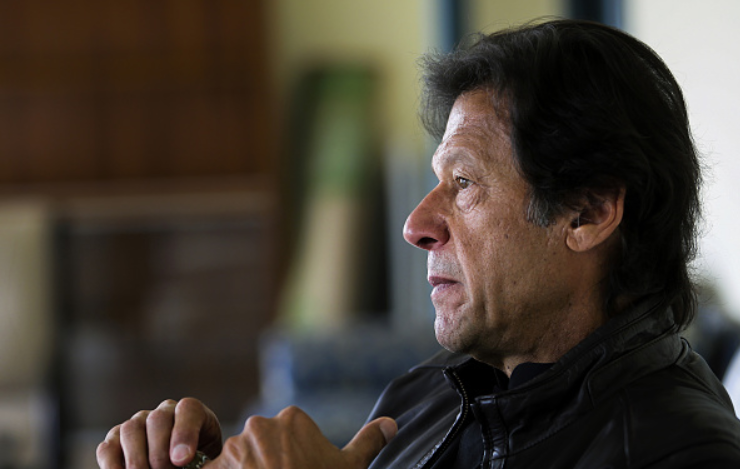
In recent weeks, Pakistan’s leadership has been communicating with international audiences through back-to-back interviews with foreign media based in Afghanistan, Canada, and the United States. These interviews by Prime Minister Imran Khan and Foreign Minister Shah Mahmood Qureshi have covered a range of topics related to Pakistan’s foreign policy and domestic issues. The primary focus, however, has been on the evolving situation in Afghanistan and Pakistan’s relations with India and the United States. That Washington is the intended audience can be determined by the fact that the day after Prime Minister Khan’s interview with Jonathan Swan aired on HBO the Washington Post published an opinion piece by Khan outlining Pakistan’s position on Afghanistan.
With these interviews and public statements, Pakistani leadership has sought to signal Pakistan’s concern on the changing situation on the ground in Afghanistan as the U.S. military is undertaking an expedited withdrawal. Pakistan had previously called for a “responsible withdrawal” and now that the United States is exiting, Islamabad fears the situation in Afghanistan will deteriorate at a rapid pace and that the U.S.-led international community will scapegoat Pakistan for uptick in the violence that ensues. Islamabad wants to avoid that outcome and also does not want to be a battleground for another round of conflict. This has also been the reason for the strong public opposition to U.S. access to Pakistan’s airbases – an opposition reiterated by Khan in his Axios interview and leading to domestic social media lauding Khan for his clear stance with the hashtag “Absolutely Not” trending for days in Pakistan. However, it is probable that Pakistan seeks enhanced security cooperation with the United States on Afghanistan post military withdrawal.
That Washington is the intended audience can be determined by the fact that the day after Prime Minister Khan’s interview with Jonathan Swan aired the Washington Post published an opinion piece by Khan outlining Pakistan’s position on Afghanistan.
Pakistan is also signaling an interest in a renewed bilateral relationship with the United States. Islamabad recognizes that it needs to maintain bilateral ties with Washington, which views Pakistan as an important regional stakeholder. Pakistani leadership has been pitching a broad-based new relationship with the United States where Washington looks at Pakistan beyond the Afghanistan prism. Pakistan seeks qualitative improvement in bilateral relationship with the United States, and primarily, enhanced economic, trade, and defense cooperation. The recent media appearances are reaffirming a consistent message from Islamabad: Pakistan’s priorities have shifted from geopolitics to geoeconomics, as repeatedly stated by Foreign Minister Qureshi and National Security Advisor Moeed Yusuf.
Meanwhile, on India, Prime Minister Khan and Foreign Minister Qureshi have repeated the stated position that Pakistan is ready for dialogue provided India takes step to create conducive environment through reversal of steps taken on August 5, 2019. As Khan’s interview was to a U.S. audience, he also sought to enlist American support for resolving the Kashmir dispute. Developments in recent months – including the ceasefire on the Line of Control and backchannel talks with India – indicate Islamabad’s willingness to improve the bilateral relationship after months-long push to gain support from other countries at multilateral forums such as the UN and the OIC against India’s heavy-handedness in Kashmir. Through public diplomacy Islamabad is communicating to New Delhi that onus of next step lies with the latter.
As Pakistani political leaders are making a genuine effort to present their viewpoint and project their country’s interests, they are doing so with an eye on domestic audience. This, at times, leads to commenting on politically divisive issues which, in turn, undercuts the focus of external messaging to an international audience.
The recent interviews are an attempt to change Pakistan’s narrative in the world. Under the PTI government Pakistan has pursued a proactive strategic communication policy to engage with international audiences. The pitch has been that Pakistan is pursuing economic security and wants to avoid getting dragged into bloc politics and active conflicts, and it is communicating these foreign policy goals through international media. Previously, Pakistani interlocutors have complained of not being understood by foreign audiences and international media. As Pakistani political leaders are making a genuine effort to present their viewpoint and project their country’s interests, they are doing so with an eye on domestic audience. This, at times, leads to commenting on politically divisive issues which, in turn, undercuts the focus of external messaging to an international audience, which expects clear policy pronouncements. This is likely to be a challenge Pakistani leadership will need to mitigate going forward if international media outlets are used as platform to project foreign policy priorities.
***


